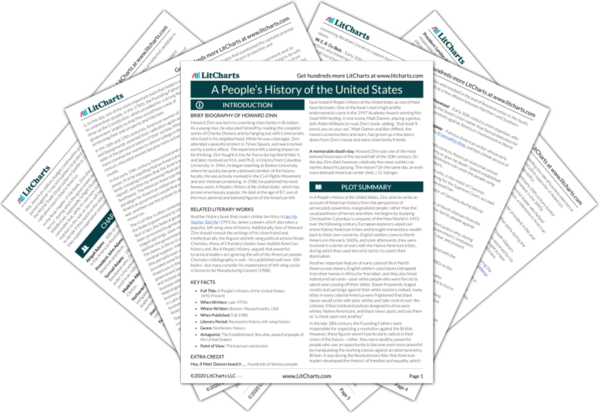The American People
As its title would suggest, Howard Zinn’s A People’s History of the United States is, above all, a history of the country from the perspective of the American people. However, when he talks about the “American people,” Zinn means something very different from “every person who has ever lived in America.” Zinn is talking specifically about the American people who have the least power and political representation, and who are least likely to be treated…
read analysis of The American PeopleThe Establishment
Although Zinn’s book is, first and foremost, about the American people, he argues that American history is, in large part, about the clashes between the least powerful Americans and their opposites: powerful, influential, Americans, which Zinn terms the Establishment (and uses interchangeably with “the elite” and “the rich”). Much like the category of “the American people,” Zinn’s notion of the Establishment incorporates many different people, groups, and institutions, sometimes with mutually contradictory agendas. However, Zinn…
read analysis of The EstablishmentRadicalism Vs. Reform
In many ways, Howard Zinn’s version of American history is depressing: again and again, he shows how the powerful Establishment uses violence and propaganda to thwart the American people’s efforts to fight for change. However, at times, Zinn acknowledges that American society has seen significant changes for the better: women won the right to vote, black slaves won their freedom, and life expectancy and the literacy rate have risen. Zinn often offers a counterintuitive interpretation…
read analysis of Radicalism Vs. Reform
Militarism and Conquest
From 1492 onwards, conquest has been one of the key themes of American history. The New World was founded on Christopher Columbus’s military conquest of Haiti and, in the centuries that followed, Spanish and English explorers’ bloodthirsty conquest of the Native American tribes who’d lived in the Americas for thousands of years. Throughout his book, Zinn shows how militarism—both the literal act of conquering other people with military force, and the more abstract ideology…
read analysis of Militarism and ConquestBias and Historiography
Howard Zinn’s book is a history of the United States, but it’s also a critique of other books on the same subject. Zinn argues that many previous histories of the United States haven’t been fair in their accounts of the past; in particular, they’ve glorified Establishment figures, marginalized or demonized the contributions of the ordinary American people, and celebrated superficial reforms for being revolutionary. While Zinn doesn’t offer a full-scale investigation of bias in American…
read analysis of Bias and Historiography






